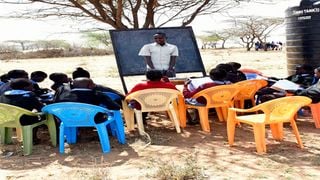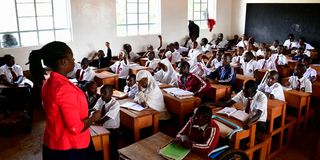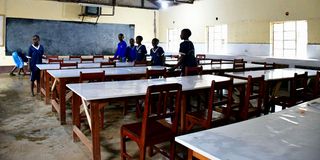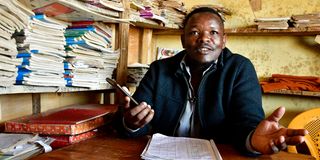
Mike Solitei, a teacher at Ntinyika Primary School in Matapato North Ward, Kajiado Central Constituency, teaches Grade Six pupils on September 21, 2023. The school has no classrooms for Junior Secondary School learners.
| Francis Nderitu | Nation Media GroupNews
Premium
Junior school teachers: Overwhelmed, overworked, ill-skilled and underpaid
What you need to know:
- Teachers cite difficult working conditions, work overload and poor pay among the issues they have to go through as they await permanent employment.
- To teach in junior secondary school, a teacher requires to have a diploma or bachelor’s degree in education, with specialisation in two teaching subjects.
When the Teachers Service Commission (TSC) advertised vacancies for 36,000 teaching jobs at the beginning of the year, well over 300,000 teachers put in applications, exposing the high unemployment rate in the country.
Out of this number, 20,000 were earmarked for deployment to junior secondary on contract. The commission later advertised 20,000 more positions and the teachers were deployed in September 2023.
The commission engages the teachers through an ‘internship’ programme that started in 2019. Jobless teachers compete for the few vacancies in the hope that it will open up opportunities for employment on permanent and pensionable terms.
However, many of the teachers who spoke to Nation told of difficult working conditions, work overload and poor pay among the issues they have to go through as they await permanent employment.

A teacher, Zaituni Chepkrui, takes her students through a Social Studies lesson at Bomet Township Primary and Junior Secondary School in Bomet County.
“It was overwhelming. There was culture shock and I didn’t expect a lot of things. It’s been such a ride. I was teaching in a secondary school before and was used to teaching older learners. When I came here, the learners are so little. The eldest one in junior school is 14 and some are as young as 11 years. At first, I didn’t know how to handle them,” said Maryam Chebet*, a teacher at a junior school in Bomet County.
At first she was the only teacher at the school before another one was posted at the institution the following month.
There are two junior school streams at the school. Two other teachers were posted in September while one more was deployed from the primary section.
“I’m trained to teach history and Kiswahili and didn’t have an idea on how to teach the other subjects but when we arrived, the headteacher told us we were to teach all the 12 subjects,” Ms Chebet said.
She added that they received assistance from other teachers from the primary section.
To teach in junior secondary school, a teacher requires to have a diploma or bachelor’s degree in education, with specialisation in two teaching subjects, the same qualification required to teach in a secondary school.

Students of St Don Bosco Junior Secondary Boys Boarding School in Bomachoge Chache, Kisii County clean a laboratory for Grade 7 learners on September 22.
“Teachers and learners are also burdened by the workload. We started learning late and the materials were also supplied late. We’re trying to cover as much ground as we can before we close school. We expect to have about 300 learners in Grade 7 and 8 next year yet we’re only six junior school teachers. We hope we’ll get more posted here,” another teacher said.
However, former Basic Education Principal Secretary Dr Julius Jwan faulted headteachers for the way they allocated duties. He said teachers only need retooling to teach in junior school and those in primary school should handle the subjects without problems.
“The one or two teachers who were posted there are basically meant to complement the teachers who were already there who were trained on the implementation of the CBC. The subjects remain the same. Mathematics will remain mathematics and the only thing that’s going to change is how it’s implemented. The same with English. It’ll remain the same,” said Dr Jwan who served as the director of the Kenya Institute of Curriculum Development when the curriculum reform was conceptualised.
“Shortage of teachers in schools didn’t start and will not end with CBC. There was also a misconception on the teachers for learners in Grade 7. Probably when they were posted, they came with this idea that they are junior school teachers. You can’t teach all the subjects. If a teacher is posted to a school, let them teach what they’re qualified to teach. It’s the duty of the headteacher to allocate the lessons,” he told Nation.
“The headteacher was supposed to allocate that teacher what he’s qualified to teach. If he dropped sciences at some level and he never touched them at all, you don’t expect him to teach those sciences, because what will he be teaching?” Dr Jwan posed.
The teachers deployed in junior school this year are all ‘interns’ on one-year contracts. Those who spoke to Nation said that the Sh20,000 they earn monthly is hardly enough for their upkeep. The interns do not qualify for any allowances and are also not covered in the teachers’ medical scheme.
Those who are deployed in the primary section earn a monthly income of Sh15,000, a figure teachers unions protest is below the national minimum wage of Sh15,201. The unions, however, have offered lacklustre defence for the teachers as they do not belong to the unions.
“I rely on my father to pay some bills and see me through the month. It gets worse as the money is taxed and is subject to other statutory deductions,” said Phillip Abuya*, a teacher we met in Kisii County.
During recruitment for teachers on permanent terms, teachers who have served as interns are scored higher than those who have not, in recognition of their service.

Ntinyika Primary School Principal Paul Matheri Kamau during an interview at the school on September 21.
While appearing before the National Assembly Committee on Education in May this year, the CEO of TSC Nancy Macharia said that the interns who were hired this year will be absorbed on permanent terms in 2025. She explained that if the terms of employment were converted to permanent terms, the commission would not have enough resources to staff junior schools.
The Kenya Kwanza administration has pledged to recruit 116,000 teachers in two financial years. So far, 56,000 have been recruited.
“The government should make it clear that we’ve been hired as interns. To say they have achieved the required number is not accurate. They should only give the number of teachers employed on permanent basis,” a teacher told Nation.





